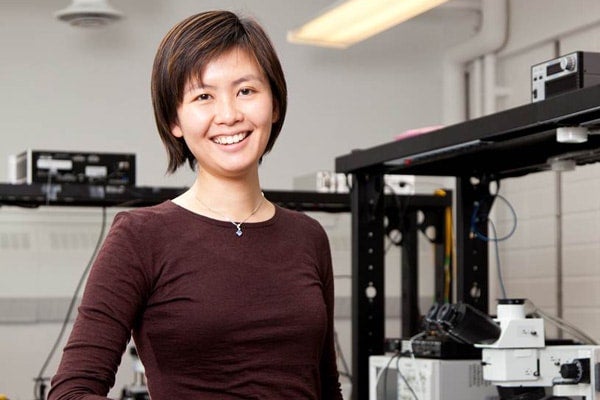
U of T wins four new Canada Research Chairs
Published: March 13, 2012
How much power does your computer use? If you unplugged it, you probably wouldn’t notice a difference in your hydro bills. But did you know that massive data centres that store lots of the data you access with your computer — or your phone — are eating up billions of dollars in power every year?
Joyce Poon of the Edward S. Rogers Sr. Department of Electrical and Computer Engineering is working on making computing greener. She’s one of four University of Toronto researchers awarded a prestigious Canada Research Chair on March 13.
“The way we compute is transitioning to what we call cloud computing,” said Poon. “Data is no longer stored on your computer or your phone.” Think of your gmail account—you can access it anywhere there’s an Internet connection because the actual content is stored in remote servers and downloaded as needed.
“One of the challenges of cloud computing is the enormous power consumption required to run the data centres where everything is stored. Their current global power consumption is 220 billion kilowatt hours a year. In the U.S. alone the cost of this energy is about $10 billion a year, and it’s growing at an exponential rate.”
Traditionally, metal wires are used to create connections within data centres, as well as within individual computers and on chips inside computers. As the CRC in Integrated Photonic Devices, Poon is exploring how these connections might be made with light instead, which would be much more energy efficient.
“We already use fibre optics to communicate over long distances,” she said. “The challenge is to develop devices that are ultra-compact, high-speed and consume very little energy.”
Poon will lead a team developing these devices, many of which are hundreds of times smaller than the width of a human hair.
The Canada Research Chairs program, administered by the federal government, invests $300 million annually as part of a strategy to attract and retain the most promising researchers. To date, the program has invested more than $315 million in U of T researchers.
Three other professors join the ranks of U of T’s other 238 CRCs:
Constantin Christopoulos of civil engineering is the CRC in Seismic Resilience of Infrastructure. Contemporary building codes aim to save lives in the event of an earthquake but have little effect in terms of preventing material damage to buildings or disruption of essential services in a city. Christopoulos aims to change this by developing a new generation of earthquake-resistant infrastructure.
Andreas Laupacis of medicine and St. Michael’s Hospital is the CRC in Health Policy and Citizen Engagement. He will develop a website to encourage dialogue about health policy in Ontario and use a new film-based research technique to explore the tensions that have arisen among patients with Multiple Sclerosis, doctors, researchers and politicians over a controversial new treatment called “liberation therapy.”
Milica Radisic of chemical engineering and applied chemistry and the Institute of Biomaterials and Biomedical Engineering is the CRC in Functional Cardiovascular Tissue Engineering. She is working on engineering new cardiac tissue, which could ultimately be used to replace damaged tissue. Along the way, the samples of healthy and diseased human heart tissue she creates will be used as models for drug testing and delivery.
The following professors saw their existing CRCs renewed:
• Gabrielle Boulainne of molecular genetics and the Hospital for Sick Children (CRC in Molecular and Developmental Neurobiology);
• Warren Chan of the Institute of Biomaterials and Biomedical Engineering (CRC in Nanomedicine);
• Leah Cowen of molecular genetics (CRC in Microbial Genomics and Infectious Disease);
• Joseph Culotti of molecular genetics and Mount Sinai Hospital (CRC in Molecular Neurogenetics);
• Darrell Desveaux of cell and systems biology (CRC in Plant-Microbe Systems Biology);
• Daniel Dumount of medical biophysics and the Sunnybrook Health Sciences Centre (CRC in Angiogenic and Lymphangiogenic Signalling);
• John Floras of medicine and Mount Sinai Hospital (CRC in Integrative Cardiovascular Biology)
• Cheryl Grady of psychiatry and Baycrest (CRC in Neurocognitive Aging);
• Thomas Kislinger of medical biophysics and the University Health Network (CRC in Proteomics in Cancer Research);
• Freda Miller of molecular genetics and the Hospital for Sick Children (CRC in Developmental Neurobiology);
• Jennifer Murphy of chemistry (CRC in Atmospheric and Environmental Chemistry);
• Jennifer Ryan of psychiatry and Baycrest (CRC in Cognitive Neuroscience of Memory);
• Simon Sharpe of biochemistry and the Hospital for Sick Children (CRC in Structural Biology of Membrane Active Proteins); and
• Juan-Carlos Zúñiga-Pflücker of immunology and Sunnybrook Health Sciences Centre (CRC in Developmental Immunology).
Professor Paul Young, U of T’s vice-president (research) offered his congratulations to the new and renewed CRC holders. “We at the University of Toronto are proud that so many of our faculty members have been awarded CRCs. This is a testament to the scholarly excellence and consistent leadership shown by our researchers. I extend my thanks, on behalf of U of T, to the government of Canada for its continued support of our researchers—and of research across the country—through the CRC program.”



